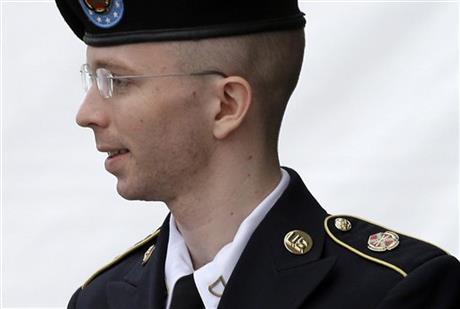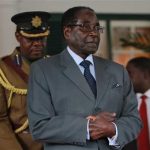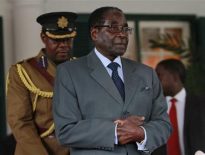FORT MEADE, Md. (AP) — Acquitted of the most serious charge against him, Army Pfc. Bradley Manning still faces up to 136 years in prison for leaking government secrets to the website WikiLeaks, and his fate rests with a judge who will begin hearing arguments Wednesday in the sentencing phase of the soldier’s court-martial.

The former intelligence analyst was convicted of 20 of 22 charges for sending hundreds of thousands of government and diplomatic secrets to WikiLeaks, but he was found not guilty of aiding the enemy, which alone could have meant life in prison without parole.
“We’re not celebrating,” defense attorney David Coombs said. “Ultimately, his sentence is all that really matters.”
The judge prohibited both sides from presenting evidence during trial about any actual damage the leaks caused to national security and troops in Afghanistan and Iraq, but lawyers will be allowed to bring that up at sentencing.
The release of diplomatic cables, warzone logs and videos embarrassed the U.S. and its allies. U.S. officials warned of dire consequences in the days immediately after the first disclosures in July 2010, but a Pentagon review later suggested those fears might have been overblown.
The judge also restricted evidence about Manning’s motives. Manning testified during a pre-trial hearing he leaked the material to expose U.S military “bloodlust” and diplomatic deceitfulness, but did not believe his actions would harm the country. He didn’t testify during the trial, but he could take the stand during the sentencing phase.
Lisa Windsor, a retired Army colonel and former judge advocate, said the punishment phase would focus on Manning’s motive and the harm that was done by the leak.
“You’re balancing that to determine what would be an appropriate sentence. I think it’s likely that he’s going to be in jail for a very long time,” said Windsor, now in private practice in Washington.
The judge, Army Col. Denise Lind, deliberated three days before reaching her verdict in a case involving the largest leak of documents in U.S. history. The case drew worldwide attention as supporters hailed Manning as a whistleblower and the U.S. government called him an anarchist computer hacker and attention-seeking traitor.
The verdict denied the government a precedent that freedom of press advocates had warned could have broad implications for leak cases and investigative journalism about national security issues.
Whistleblower advocates and legal experts had mixed opinions on the implications for the future of leak cases in the Internet age.
The advocacy group Reporters Without Borders said the verdict was a chilling warning to whistleblowers, “against whom the Obama administration has been waging an unprecedented offensive,” and threatens the future of investigative journalism because intimidated sources might fall quiet.
However, another advocate of less government secrecy, Steven Aftergood of the Federation of American Scientists, questioned whether the implications will be so dire, given the extraordinary nature of the Manning case.
“This was a massive hemorrhage of government records, and it’s not too surprising that it elicited a strong reaction from the government,” Aftergood said.
“Most journalists are not in the business of publishing classified documents, they’re in the business of reporting the news, which is not the same thing,” he said. “This is not good news for journalism, but it’s not the end of the world, either.”
Glenn Greenwald, the journalist, commentator and former civil rights lawyer who first reported Edward Snowden’s leaks of National Security Agency surveillance programs, said Manning’s acquittal on the charge of aiding the enemy represented a “tiny sliver of justice.”
But WikiLeaks founder Julian Assange, whose website exposed Manning’s spilled U.S. secrets to the world, saw nothing to cheer in the mixed verdict.
“It is a dangerous precedent and an example of national security extremism,” he told reporters at the Ecuadorean Embassy in London, which is sheltering him. “This has never been a fair trial.”
Federal authorities are looking into whether Assange can be prosecuted. He has been holed up in the Ecuadorean Embassy in London to avoid extradition to Sweden on sex-crimes allegations.
The material WikiLeaks began publishing in 2010 documented complaints of abuses against Iraqi detainees, a U.S. tally of civilian deaths in Iraq, and America’s weak support for the government of Tunisia — a disclosure Manning supporters said helped trigger the Middle Eastern pro-democracy uprisings known as the Arab Spring.
To prove aiding the enemy, prosecutors had to show Manning had “actual knowledge” the material he leaked would be seen by al-Qaida and that he had “general evil intent.” They presented evidence the material fell into the hands of the terrorist group and its former leader, Osama bin Laden, but struggled to prove their assertion that Manning was an anarchist computer hacker and attention-seeking traitor.





